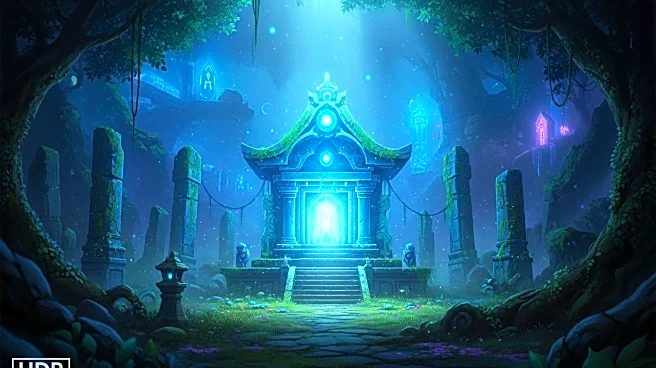What's Happening?
Shrine's Legacy, a 16-bit action RPG developed by Positive Concept Games, is set to release on PC on October 7. The game, inspired by SNES-era RPGs, follows young heroes Rio and Reima as they attempt to banish an ancient evil. Developed by Alan Gabbard and Joseph Duke, the game offers both solo and co-op gameplay, allowing players to control either Rio, a melee fighter, or Reima, a ranged mage. The game was funded through a successful Kickstarter campaign and is the first release for the company. The developers drew inspiration from classic games like Chrono Trigger and Zelda, aiming to balance retro aesthetics with modern gameplay features.
Why It's Important?
Shrine's Legacy represents a nostalgic return to the classic SNES era, appealing to fans of retro gaming while incorporating modern gameplay elements. The game's release highlights the growing trend of indie developers creating games that pay homage to classic titles, potentially influencing the industry by encouraging more developers to explore retro-inspired projects. The successful Kickstarter campaign underscores the viability of crowdfunding for indie game development, allowing creators to bring unique visions to life without traditional publishing constraints.
What's Next?
Following its PC release, Positive Concept Games plans to expand Shrine's Legacy to other platforms, including the Nintendo Switch. The developers aim to release the Switch port by early next year, contingent on the game's success. They also plan to support the game post-launch with updates, including additional mini-boss battles and a Hard Mode setting. The developers hope to continue their game development careers, using the success of Shrine's Legacy as a foundation for future projects.
Beyond the Headlines
Shrine's Legacy's focus on co-op gameplay addresses a gap in the RPG genre, where multiplayer options are often limited. The game's design philosophy, influenced by titles like Secret of Mana, emphasizes shared experiences, potentially encouraging other developers to incorporate co-op features in RPGs. The game's narrative, balancing dramatic storytelling with humor, reflects a broader trend in gaming to create engaging and emotionally resonant stories.










